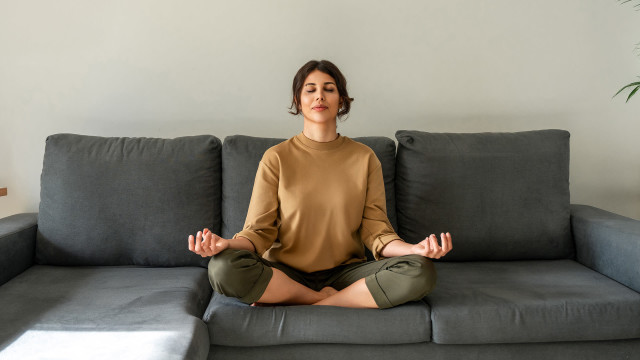Here’s How Music Can Help You Sleep

Sound has an intimate connection with sleep, capable of soothing you into a deep slumber or rousing you to the point where sleep is impossible. (If you’ve ever tried to sleep with a mosquito in the room, you know what I’m talking about.)
Although many people use fans or white noise machines to create the perfect sleep environment, others prefer music. Scientific studies increasingly support the efficacy of playing music to help you fall asleep faster, but choosing the right music to fall asleep to is a little more nuanced than just pressing play.
How Does Music Affect the Brain?
To understand how music affects us, I interviewed Julene Siddique, a composer, academic, and education expert with Roundglass Learn.
Currently serving as co-chair of the Arts, Humanities, and Culture group for Global Leadership 21, a partnership between The World Academy of Art & Science and UN Office Geneva, Siddique is certified in neurological music therapy and is currently researching both the cognitive and social aspects of music.
“When it comes to the neurology of music, what happens during the listening experience is that numerous parts of the brain light up,” Siddique explains. “Music is a whole-brain activity. It stimulates your entire brain, and it can also stimulate both your sympathetic and parasympathetic nervous systems.”
Your sympathetic nervous system is responsible for responding to stress by doing things like releasing adrenaline or boosting heart rate, while the parasympathetic nervous system controls the opposite response, sometimes referred to as “rest and digest.” Stimulating the parasympathetic system sends a signal from your mind to your body that it's OK to let your guard down to eat, relax, and yes, sleep.
Even without knowing the science behind it, you may already be using music to trigger these responses. When choosing music for a workout, for example, you may pick songs that stimulate your sympathetic system, getting you keyed up, motivated, and ready to push yourself. The songs you would choose to sing to a child at bedtime, however, are likely slower, softer, and designed to relax — triggering the parasympathetic system instead.
Few adults fall asleep to lullabies anymore, but studies show we might want to consider it. As it turns out, the way music affects the brain and the body makes it a very effective sleep aid.
How Music Benefits Sleep
A growing body of research is demonstrating that because calming music triggers those measurable parasympathetic responses like reduced anxiety, lowered blood pressure, slower breathing, and lower heart rate, it’s a great sleep aid, helping insomnia sufferers fall asleep faster and get better sleep quality, too.
A study of 94 students between the ages of 19-28 who reported poor sleep quality found that listening to relaxing music may help facilitate good sleep by distracting you from your thoughts and relaxing tense muscles. During the 21-day study, participants were split into three groups, one group listened to music for 45 minutes before falling asleep, the second group listened to 45 minutes of an audiobook, and the third group received no intervention.
After measuring sleep quality each week using the Pittsburg Sleep Quality Index, participants in the music group reported statistically significant improvements in sleep quality, while participants in neither the audiobook nor the control group saw any significant change.
A meta-analysis of ten different research studies involving a total of 557 participants came to the same conclusion, stating that music is effective at helping sufferers of both acute and chronic sleep disorders get better sleep.
Of course, knowing that music can help you fall asleep faster is only half of the story. What kind of music you choose matters, too. To put together the perfect sleep playlist, there are several factors to keep in mind.
Which Type of Music Can Help You Fall Asleep?
To create a calm, relaxed state conducive to falling asleep, Siddique advises paying attention to the style of a song. “You would want something with a slow tempo,” she says. “And I also always say to keep it instrumental, unless the singing is in another language which you don't understand, because words immediately draw the mind’s attention.”
Siddique also recommends beginning your playlist with calming songs that you already love, to help nudge your mind from a state of stress, arousal, or anxiety, into calm. “If there are songs that are comforting to you or that relax you, put those at the beginning of the playlist,” she says. “You don't want those playing later on when you're really dozing off, but if those are the ones that are going to help you calm down because they're comforting or meaningful to you, then I would make sure they’re at the beginning, when you’re trying to move into that calmed-down state.”
This track from the Roundglass music library is a great example of the kind of soothing music Siddique is talking about (slow tempo and without lyrics) that can help encourage you to fall asleep.
Try this Roundglass meditation music track: Gentle Winds
Cognitive Neuroscientist David Vago, Ph.D., says that measuring brain waves can also give clues about the kind of music that can help you get a deep sleep.
Vago explains that the best brain rhythms for sleep are alpha waves, which are around eight to 12 hertz. Alpha waves are what you’d see in the brain of someone quietly relaxed, perhaps lying in bed with their eyes closed. (Also, coincidentally, during meditation.) If you’re searching for music to help you fall asleep, says Vago, you want to find songs that activate that alpha frequency.
How do you know what music is likely to create that response without being able to measure brain waves in real-time? Pay attention to your heartbeat, your breath, and your emotional response. While you won’t be able to measure your brain waves, you can feel how your mind and your body react as you listen.
But don’t worry if your musical tastes skew a little more toward rock ‘n roll than relaxation — you can still use your favorite tunes to help you fall asleep.
Try this Roundglass meditation music track: Cycles within Cycles - Tropical Rainforest
Good News for Heavy Metal Fans
Vago explains that while calming music, like the tracks above, may help one person release anxiety and fall asleep, others might struggle to go to sleep while listening to the same song.
The key here is to pay attention to the sensations you experience while listening to the music. Just like not every style of meditation will be right for you, not every musical genre will be right for you to listen to while trying to fall asleep.
“If your music can encourage you to be less distracted and your body's more relaxed when you listen to it, that's the music you want,” he says. “So, whether it's hard rock or heavy metal or Bach, find what makes you feel relaxed in your body and what helps you get out of your head.”
One research study put this strategy to the test, examining the experiences of 52 women who were asked to use music to fall asleep. The participants — all over the age of 70 and diagnosed with a sleep disorder — were asked to listen to a music album of their choosing before falling asleep for 10 nights in a row.
Though the music choice varied, results indicated that listening to the album decreased both the time it took to fall asleep and the number of times they woke during the night, regardless of genre.
Your Personal Sleep Study
Sleep is highly personal and while research supports using music to help fall asleep faster, wake up less often, and get better quality sleep, ultimately the only sleep study that matters is yours.
Both Siddique and Vago agree that cultivating an awareness of your mind, your body, and your sleep experiences is the best way to begin improving your sleep. So, try conducting your own sleep study!
Browse through the Roundglass music library and create a few sleep playlists. Try listening to some soothing music before you go to sleep for a week or two and keep a sleep journal to record your results. (If you’re a real data nerd, you could even assess yourself using the Pittsburgh Sleep Quality Index above.)
If the calming music isn’t working, try pulling from your personal playlist using the tips from Vago and Siddique, or switch gears and listen to a guided sleep meditation like this, instead:
Try this Roundglass meditation class, Prepare for More Restful Sleep, by mindfulness teacher Vishvapani Blomfield.
Above all, remember that sleep is a vital component of wholistic wellbeing, serving as a foundation for much of our physical, physiological, and mental health. Finding what can help you get a better night’s sleep may take some experimentation, but your wellbeing is worth it.
Key Takeaways:
- Music stimulates the entire brain.
- Add music to your nighttime routine.
- Slow tempo music is ideal for sleep.












